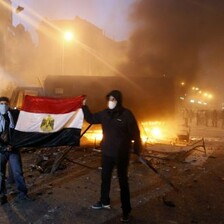Today, between 5,000 and 6,000 people — Israeli peace activists, Palestinians in Israel and Palestinian MK’s in the Israeli Knesset — marched to the Kalandia checkpoint.
The aims of this protest were:
1. To ensure that urgently needed aid people here had collected - medicines and food - would enter Ramallah.
2. For the Palestinians, to try to enter Ramallah, breaking the military closure around the city and
protesting against the curfew and occupation;
3. To protest America’s open support for the clearly illegal occupation, and re-assault in the West Bank.
We marched to Kalandia with women leading, straight to the checkpoint, which is currently a big set of plastic and concrete blocks blocking off the main road into Ramallah, heavily guarded by armed Israeli soldiers and police.
We began to push against the blocks. I was in the front line. The soldiers and police reacted by letting off sound bombs over our heads, which caused people to panic. Tear gas bombs were thrown at us. “Tear gas” causes a temporary inability to breath, then immense pain as the gas enters your lungs and eyes. With that, people dispersed, running for cover. From nowhere, onions were passed out. A few minutes later, people re-gathered. We marched to the checkpoint blocks again.
The truck passed through into Ramallah after much bargaining and pleading. By accident, one young Palestinian woman found herself on the other side of the checkpoint. She returned to us by climbing over the checkpoint. The soldiers and police began to argue with her (after she arrived to the other side of the checkpoint, our side). A policeman lost his temper and began to beat her, the green light for the police to throw more tear gas at the crowd, dispersing us again.
The police were indiscriminately beating people - friends running away were smashed with batons, the police pushed an old man before me. The press was affected by the tear gas. It seemed that they had been specifically targeted. They were clearly marked with “TV” - it’s impossible that the police didn’t’t see that.
We ran away and re-gathered. The police began to organize themselves. They pushed aside their plastic barriers and began to chase us, throwing tear gas into the crowds and beating us with batons. We kept regrouping, chanting, waving Palestinian flags, standing in groups with our hands linked, refusing to be beaten into submission, refusing to use force. Police would stand behind us, beating us with their batons, abusing us, especially the Druze police, who kept abusing us in Arabic. If we reacted, they would beat us. If we ran, they would chase after us, throwing tear gas and beating us.
One young man was caught. Around 5-6 policemen stood around him, beating him, kicking him, smashing their batons upon him. Then he was arrested.
Towards the end of the protest, we stood at traffic lights, closer to Beit Hanina. Again, chanting, grouping up, waving Palestinian flags. The police surrounded us, throwing more tear gas and beating who ever they could catch. We took refuge behind cars, in the grassy, muddy field below the road, anywhere we could. It was a war zone, but only one side was armed.
We kept searching for each other, seeking familiar faces, to reassure ourselves. In pauses between teargas, sound bombs and violent police, we were hugging, sometimes crying. As we walked back to our buses, we could count the toll: around 30 injured, including three Palestinian MK’s in the Knesset - Issam Makhoul, Ahmad Tibi and Mohammad Barakeh. Two young men arrested. One young man has his finger torn off when a tear-gas bomb exploded next to his hand. A woman had her head stitched up after the police smashed her over the head with his baton.
On the bus, we received a phone call that the medicines and food convey reached the NGO’s. Some of the older Palestinian women on the bus began to weep.



